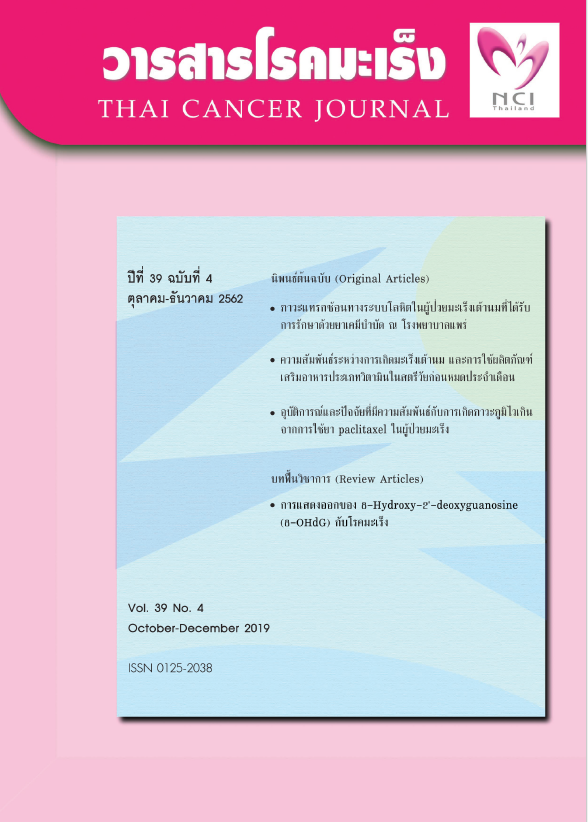Hematological Toxicity in Breast Cancer Patients undergoing Chemotherapy at Phrae Hospital
Keywords:
chemotherapy, anemia, leukopenia, neutropenia, thrombocytopeniaAbstract
Hematological toxicity related to bone marrow suppression is a common treatment complication of patients undergoing chemotherapy. This may cause dose adjustment, delay treatment, or hospitalization, leading to diminished treatment efficacy, clinical status and quality of life. The objective of this descriptive retrospective study was to examine the incidence and severity of hematologic toxicity among breast-cancer patients undergoing chemotherapy. Two hundred and twenty (220) patients underwent chemotherapy at the Chemotherapy Unit, Phrae Hospital, between January 2012 and December 2016. Data collected from patients' records were reviewed for hematological toxicity, comprising anemia, leukopenia, neutropenia, and thrombocytopenia. The incidence and severity of hematological toxicity were analyzed. The findings showed that the highest incidence of anemia was observed in 100% of patients treated with docetaxel and paclitaxel protocols, with leukopenia and neutropenia of 100% and 64.71%, respectively, among patients treated with the paclitaxel protocol. The lowest incidence of thrombocytopenia was found in 11.76% of cases treated with the paclitaxel protocol. The severity of hematological toxicity varied significantly across chemotherapy regimens; the highest severity of anemia (grade 3) was observed among patients treated with the fluorouracil, doxorubicin (Adriamycin), and cyclophosphamide (FAC) and AC protocols, with grade 3 leukopenia in FAC and paclitaxel protocols; both grade 4 neutropenia and grade 3 thrombocytopenia were observed among patients treated with the FAC protocol. It is suggested that hematologic-toxicity complications should be examined regularly and cautiously for breast-cancer patients undergoing chemotherapy
References
World Cancer Research Fund international. Breast cancer statistics. Available at: http://www.wcrf.org/int/cancer-facts-figures/data-specificcancers/ breast-cancer-statistics. Accessed January 20, 2019.
สถาบํนมะเร็งแห่งชาติ. ทะเบียนมะเร็งระดับโรงพยาบาล พ.ศ. 2556. กรุงเทพฯ : บีที เอส เพรส; 2558.
National Cancer Institute. Cancer Treatment. Available at: https://www.cancer.gov/about-cancer/treatment. Accessed January 20, 2019.
American Cancer Society. Treating Breast Cancer. Available at: https://www.cancer.org/cancer/breastcancer/treatment.html. Accessed January 24, 2019.
สุวรรณี สิริเลิศตระกูล , สุวลักษณ์ วงศ์จรรโลงศิล, ประไพ อริยประยูร, แม้นมนา จิระจรัส.การพยาบาลผู้ป่วยมะเร็ง. สมทุรปราการ: สินทวีกิจ พริ้นติ้ง; 2555.
วงจันทร์ เพชรพิเชฐเชียร. การพยาบาลที่เป็นเลิศในการดูแลผู้ป่วยมะเร็ง. สงขลา: ชวนเมืองการพิมพ์; 2554.
Breastcancer org. Chemotherapy. Available at: http://www.breastcancer.org/treatment/chemotherapy. Accessed January 24, 2019.
Hussain SA, Palmer DH, Stevens A, Spooner D, Poole CJ, Rea DW. Role of chemotherapy in breast cancer. Expert Rev Anticancer Ther 2005;5:1095110.
มะเร็งวิทยาสมาคมแห่งประเทศไทย. ทําความรู้จักกับ ยาเคมีบําบัด. เข้าถึงได้จาก: http://www.thethaicancer.com/PDF/People/ทําความรู้จักกับยาเคมีบําบัด.pdf. สืบค้นเมื่อ 21 กุมภาพันธ์ 2561.
สาขารังสีรักษาและมะเร็งวิทยา โรงพยาบาลจุฬาลงกรณ์. ความรู้เกี่ยวกับยาเคมีบําบัด. เข้าถึงได้จาก: https://www.chulacancer.net/patient-list-page.php?id=323. สืบค้นเมื่อ 21 กุมภาพันธ์ 2561.
วรรณพร สิงห์น้อย. ผลเสียต่อไขกระดูกจากการรักษาด้วยยาเคมีบําบัด (Bone Marrow Toxicity from Chemotherapy). เข้าถึงได้จาก: http://www.med.cmu.ac.th/dept/obgyn/2011/index.php. สืบค้นเมื่อ 21 กุมภาพันธ์ 2561.
George MR, Pamela SB, Morey B, David C, Asher CK, Charles C, et al. Cancer- and chemotherapyinduced anemia: NCCN clinical practice guidelines in oncology. JNCCN 2012;10:628-53.
Bryer E, Henry D. Chemotherapy-induced anemia: etiology, pathophysiology, and implications for contemporary practice. Int J Clin Transfus Med 2018; 6:21-31.
จุฬาภรณ์ จตุปาริสทุธิ์, วารุณี รัตโนทัย. ความชุกของภาวะ โลหิตจางในผู้ป่วยมะเร็งนอกระบบโลหิตวิทยาที่ได้รับการรักษาด้วยยาเคมีบำบัดในโรงพยาบาลกลาง. วารสารศูนย์การศึกษาแพทยศาสตร์คลินิก โรงพยาบาลพระปกเกล้า 2553;27:211-21.
Saloustros E, Tryfonidis K, Georgoulias V. Prophylactic and therapeutic strategies in chemotherapyinduced neutropenia. Expert Opin Pharmacother 2011;12:851-63.
Weycker D, Hatfield M, Grossman A, Hanau A, Lonshteyn A, Sharma A, Chandler D. Risk and consequences of chemotherapy induced thrombocytopenia in US clinical practice. BMC Cancer 2019;19:151.
The National Cancer Institute Common Toxicity Criteria. Cancer therapy evaluation program, common terminology criteria for adverse events, (CTCAE) version 3.0. Available at: https://ctep.cancer.gov/protocoldevelopment/electronic_applications/docs/ ctcaev3.pdf. Accessed July 20, 2019.
Groopman JE, Itri LM. Chemotherapy-induced anemia in adults: incidence and treatment. J Natl Cancer Inst 1999;91:1616-34.
Xu H, Xu L, Page JH, Cannavale K, Sattayapiwat O, Rodriguez R, et al. Incidence of anemia in patients diagnosed with solid tumors receiving chemotherapy, 2010-2013. Clin Epidemiol 2016;8:61-71.
Ithimakin S, Srimuninnimit V. Cancer anemia survey in division of medical oncology at Siriraj Hospital (CAS). J Med Assoc Thai 2009;92 Suppl 2:S110-8.
Dubsky P, Sevelda P, Jakesz R, Hausmaninger H, Samonigg H, Seifert M, et al. Anemia is a significant prognostic factor in local relapse-free survival of premenopausal primary breast cancer patients receiving adjuvant cyclophosphamide/methotrexate/ 5-fluorouracil chemotherapy. Clin Cancer Res 2008;14:2082-7.
Hashiguchi Y, Kasai M, Fukuda T, Ichimura T, Yasui T, Sumi T. Chemotherapy-induced neutropenia and febrile neutropenia in patients with gynecologic malignancy. Anticancer Drugs 2015;26:1054-60.
อภิชญา ลือพืช, ขวัญจิต ด่านวิไล. อุบัติการณ์และปัจจัยเสี่ยงต่อการเกิดภาวะเม็ดเลือดขาวนิวโทรฟิลต่ำในผู้ป่วยมะเร็งเต้านมที่รับยาเคมีบําบัดทางหลอดเลือดดํา ณ โรงพยาบาลจุฬาลงกรณ์. วารสารเภสชักรรมไทย 2560;9: 180-91.
Huang A, Ma A, Jin B, Han B. Chemotherapy-induced leukopenia as a prognostic factor in patients with metastatic non-small cell lung cancer treated with platinum-based chemotherapy. Int J Clin Exp Med 2016;9:5241-8.
Tai E, Guy GP, Dunbar A, Richardson LC. Cost of cancer-related neutropenia or fever hospitalizations, United States, 2012. J Oncol Pract 2017;13:e552e561.
Ten Berg MJ, van den Bemt PM, Shantakumar S, Bennett D, Voest EE, Huisman A, et al. Thrombocytopenia in adult cancer patients receiving cytotoxic chemotherapy: results from a retrospective hospitalbased cohort study. Drug Saf 2011;34:1151-60.
Downloads
Published
Issue
Section
License
บทความทีตีพิมพ์ในวารสารโรคมะเร็งนี้ถือว่าเป็นลิขสิทธิ์ของมูลนิธิสถาบันมะเร็งแห่งชาติ และผลงานวิชาการหรือวิจัยของคณะผู้เขียน ไม่ใช่ความคิดเห็นของบรรณาธิการหรือผู้จัดทํา







